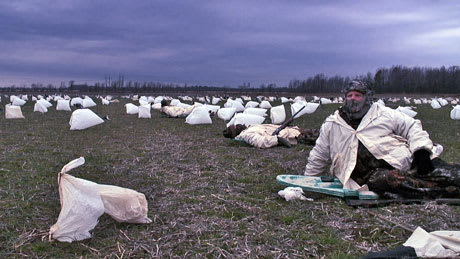In 2005, the U.S. Department of the Interior and the Cornell Laboratory of Ornithology announced that the long-extinct Ivory-Billed Woodpecker had been discovered in the swamps of eastern Arkansas, sparking excitement and hope from bird enthusiasts and researchers alike. Denizens of the nearby community of Brinkley embraced the idea with enthusiasm, driven by the potential rejuvenation of their deteriorating, Wal-Mart-dominated economy from the anticipated influx of tourists. The media joined the cause as well, preaching the miracle of a resurfaced species despite the fact that the only evidence was a blurry video.
Eventually, those removed from the event began to take a closer look at the facts, discovering that in all likelihood, the videotape showed a Pileated Woodpecker, whose colourings are similar to that of the extinct bird. Subsequently, funds utilized for preserving living birds in danger of going extinct were expended on trying to prove the existence of the Ivory-Billed Woodpecker, thus reinforcing the human cycle of wilful ignorance, rather than the acceptance of unflattering realities and responsibility.
There is an overwhelming sadness throughout Ghost Bird that echoes the very core human anxieties of annihilation and meaninglessness, along with blind hope as a means of coping with the undeniable but often ignored reality that everything ends. People would much rather believe in an unlikely miracle than acknowledge their place as a destructive species whose fleeting existence ultimately means very little. Sadly, this denial creates only a cyclic pattern of destruction, as blind ignorance may help with pesky feelings of doubt but does little to help humanity progress and learn from its mistakes.
The documentary is smart and insightful, expertly interweaving interviews and archive footage in a way that never stops short of being captivating. Appropriate parallels are drawn between dying species and communities, while everyone involved turn a blind eye, seeking only immediate gratification.
It's sharp criticism, not only of our current environmental crisis but also of a culture so afraid of feeling sad that realities are ignored and progress is stunted.
(Small Change)Eventually, those removed from the event began to take a closer look at the facts, discovering that in all likelihood, the videotape showed a Pileated Woodpecker, whose colourings are similar to that of the extinct bird. Subsequently, funds utilized for preserving living birds in danger of going extinct were expended on trying to prove the existence of the Ivory-Billed Woodpecker, thus reinforcing the human cycle of wilful ignorance, rather than the acceptance of unflattering realities and responsibility.
There is an overwhelming sadness throughout Ghost Bird that echoes the very core human anxieties of annihilation and meaninglessness, along with blind hope as a means of coping with the undeniable but often ignored reality that everything ends. People would much rather believe in an unlikely miracle than acknowledge their place as a destructive species whose fleeting existence ultimately means very little. Sadly, this denial creates only a cyclic pattern of destruction, as blind ignorance may help with pesky feelings of doubt but does little to help humanity progress and learn from its mistakes.
The documentary is smart and insightful, expertly interweaving interviews and archive footage in a way that never stops short of being captivating. Appropriate parallels are drawn between dying species and communities, while everyone involved turn a blind eye, seeking only immediate gratification.
It's sharp criticism, not only of our current environmental crisis but also of a culture so afraid of feeling sad that realities are ignored and progress is stunted.
